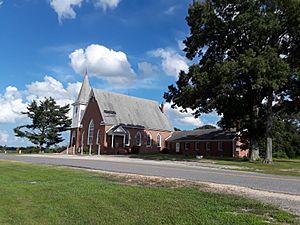Central Point, Virginia facts for kids
Quick facts for kids
Central Point, Virginia
|
|
|---|---|

St. Stephen's Baptist Church in Central Point
|
|
| Country | United States |
| State | |
| County | Caroline |
| Time zone | UTC−5 (Eastern (EST)) |
| • Summer (DST) | UTC−4 (EDT) |
Central Point is a small, unincorporated community in Caroline County, located in the U.S. state of Virginia. An unincorporated community means it's a group of homes and businesses that isn't officially a town or city with its own local government.
Contents
History of Central Point
Central Point is known for its role in an important legal case about equal rights.
The Loving v. Virginia Case
Richard Loving and Mildred Jeter grew up in Central Point. Richard was white, and Mildred had Rappahannock and African American family roots. In their small community, people often lived and worked closely together. Richard and Mildred fell in love.
In 1958, they decided to get married. However, Virginia had a law that made it illegal for people of different races to marry each other. This was called an "anti-miscegenation law." To get around this law, Richard and Mildred traveled to Washington, D.C., where they could legally marry.
Fighting for the Right to Marry
After their wedding, the Lovings returned to Central Point to live. But because of Virginia's law, they were told they had broken the law. They were forced to leave the state for 25 years to avoid being put in jail. They moved to Washington, D.C., but they really wanted to go back home to Central Point.
So, they decided to challenge the unfair law. Their case eventually went all the way to the highest court in the United States, the U.S. Supreme Court.
A Landmark Decision for Equal Rights
In 1967, the Supreme Court made a very important decision in the case known as Loving v. Virginia. The Court ruled that Virginia's law against interracial marriages was unconstitutional. This meant the law went against the Fourteenth Amendment of the U.S. Constitution, which promises equal protection and rights for all citizens.
This ruling was a huge step forward for civil rights in the United States. It meant that people of different races could legally marry anywhere in the country. The Loving v. Virginia case showed how one couple's fight for their right to be together changed laws across the nation and helped ensure equal rights for everyone.
 | Kyle Baker |
 | Joseph Yoakum |
 | Laura Wheeler Waring |
 | Henry Ossawa Tanner |



